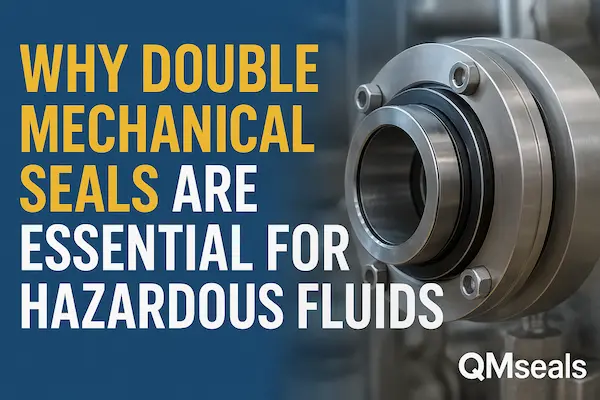Posted At: Sep 19, 2025 - 803 Views

Why Double Mechanical Seals are Essential for Hazardous Fluids
In industries handling hazardous, toxic, flammable, or corrosive fluids, ensuring safety and reliability is non-negotiable. Pumps used in such critical applications must operate with zero leakage to protect workers, equipment, and the environment. This is where double mechanical seals play a vital role.
A double mechanical seal consists of two sets of seal faces arranged either back-to-back, face-to-face, or tandem. This dual-sealing system provides an additional layer of protection compared to single mechanical seals, making them the preferred choice in hazardous fluid handling.
What Are Double Mechanical Seals?
Double mechanical seals are designed with two sealing surfaces:
Primary Seal (Product Side): Prevents the process fluid from leaking into the atmosphere.
Secondary Seal (Atmospheric Side): Acts as a safety barrier in case the primary seal fails.
These seals are often supported by a barrier or buffer fluid system that maintains pressure between the seal faces, ensuring maximum reliability.
Why Use Double Mechanical Seals for Hazardous Fluids?
Enhanced Safety
Hazardous fluids such as acids, solvents, and hydrocarbons can be harmful if released. Double seals minimize leakage risk by providing an additional containment layer.
Environmental Protection
Many industries are governed by strict environmental regulations (like EPA or ISO standards). Double mechanical seals prevent toxic emissions and help companies remain compliant.
Prevention of Seal Failure
A single seal may not withstand the pressure, temperature, or corrosiveness of hazardous fluids. Double mechanical seals distribute the load, improving overall performance and reducing seal failure incidents.
API 682 Compliance
According to API 682 mechanical seal standards, double seals are recommended for high-risk applications involving hazardous or volatile fluids. Choosing a double seal ensures compliance with global industry guidelines.
Extended Equipment Life
By preventing leaks and contamination, double mechanical seals protect pump bearings and other components, extending the equipment’s lifespan and reducing downtime.
Benefits of Double Mechanical Seals
Zero leakage assurance
Improved workplace safety
Better performance in extreme temperatures & pressures
Lower maintenance costs over time
Reliable operation in chemical, pharmaceutical, and petrochemical plants
Industries That Rely on Double Mechanical Seals
Chemical processing plants – for corrosive acids and solvents
Pharmaceutical manufacturing – for sterile, contamination-free processes
Oil & Gas refineries – handling hydrocarbons and explosive fluids
Food & Beverage industry – ensuring hygienic and safe pumping of sensitive products
Power generation plants – where toxic cooling or process fluids are used
Conclusion
For companies handling hazardous fluids, double mechanical seals are not just an option—they are a necessity. They provide superior safety, meet compliance standards, and ensure reliable pump performance in the most demanding environments. Investing in double seals not only protects your workforce but also safeguards equipment and the environment.
At QMSeals, we specialize in precision-engineered mechanical seals for hazardous applications, delivering leak-free performance and maximum reliability.
Frequently Asked Questions
1. What is the purpose of a double mechanical seal?
A double mechanical seal is designed to provide two layers of sealing protection, preventing hazardous fluids from leaking into the atmosphere. It ensures maximum safety, especially in industries dealing with toxic, flammable, or corrosive fluids.
2. Why are double mechanical seals used for hazardous fluids?
Hazardous fluids pose serious safety and environmental risks. Double seals minimize leakage by using two sealing faces and a barrier fluid, ensuring reliable containment and compliance with industry standards.
3. What is the difference between single and double mechanical seals?
A single seal has only one sealing surface, which can fail under high-pressure or corrosive conditions. A double mechanical seal adds an extra sealing surface, making it more reliable and safer for hazardous and critical applications.
4. Are double mechanical seals required by API 682?
Yes. According to API 682 standards, double mechanical seals are strongly recommended for hazardous, toxic, or volatile fluids, ensuring compliance with global safety and environmental guidelines.
5. What industries benefit the most from double mechanical seals?
Industries such as chemical processing, pharmaceuticals, petrochemicals, oil & gas, and power generation rely heavily on double mechanical seals for safe and efficient fluid handling.


